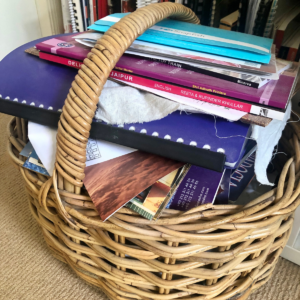I’ve seen lots of clutter in my 16 years as an organiser. I’ve seen the effect it has on relationships, mood, well-being, finances and because I now specialise in hoarding, I’ve seen the impact on safety.
4 years ago, I went into partnership with Wendy Hanes, and we created Hoarding Home Solutions, where we deliver training specifically about resolving hoarding situations. We believe that anyone who walks into a hoarded home has the ability to make the occupants safer. They just need to know how.
But clutter doesn’t have to be extreme to get in the way of living and working with ease. At a recent presentation, I spoke about “the unbearable heaviness of clutter”. It brought up lots of questions and discussions about what is clutter and what it is not. I thought I’d share some of those discussions with you.
 What is clutter?
What is clutter?
I believe that everything in life, from what’s in your home to what’s in your diary to what’s in your head, either adds to your quality of life or takes away from it. Yes, everything. It’s either contributing to your life or it’s detracting from it. Guess what? Most people, even organisers, have clutter. Yes, even me.
Clutter is anything that detracts from your space, time or energy. Here’s an example from my own home. I have an ice cream machine that I have used exactly once. It has never successfully made delicious ice cream. And yet it sits in a corner cupboard in my kitchen, taking up space.
But there’s no single definition of clutter. It is also anything you don’t use, need or love. You don’t love your tax records, but you do need them, so they are not clutter. An example of something I didn’t use, need or love was an ugly cup someone gave me long ago. It hung around in my cup drawer for a while, but then made room for another cup that I did love instead.
Clutter can also be something that doesn’t have a home, or it does have a home, but it isn’t put away there. In my home office, there’s a basket of travel memorabilia. I love it and have plans to use it, but it doesn’t have a home. So yes, it’s clutter, but it doesn’t bother me enough to do anything about it. The pain of finding a home for it and dealing with it is greater than the pain of seeing it on the floor of my office. It’s my clutter. It’s my home. The clutter police aren’t going to break the door down.
When is clutter a problem?
But there is a time when clutter does become a problem. If clutter gets in the way of having an easy life or a good relationship, then it’s probably time to do something about it. If clutter stops someone from achieving their bucket list goals or getting a good night’s sleep, then it’s probably time to do something about it. If clutter screams at them, trips them up, makes it dangerous to cook in their kitchen, or ashamed to have visitors over, then it is a problem, and it’s time to do something about it.
What is clutter to you?
I wrote another post about what clutter is here.



